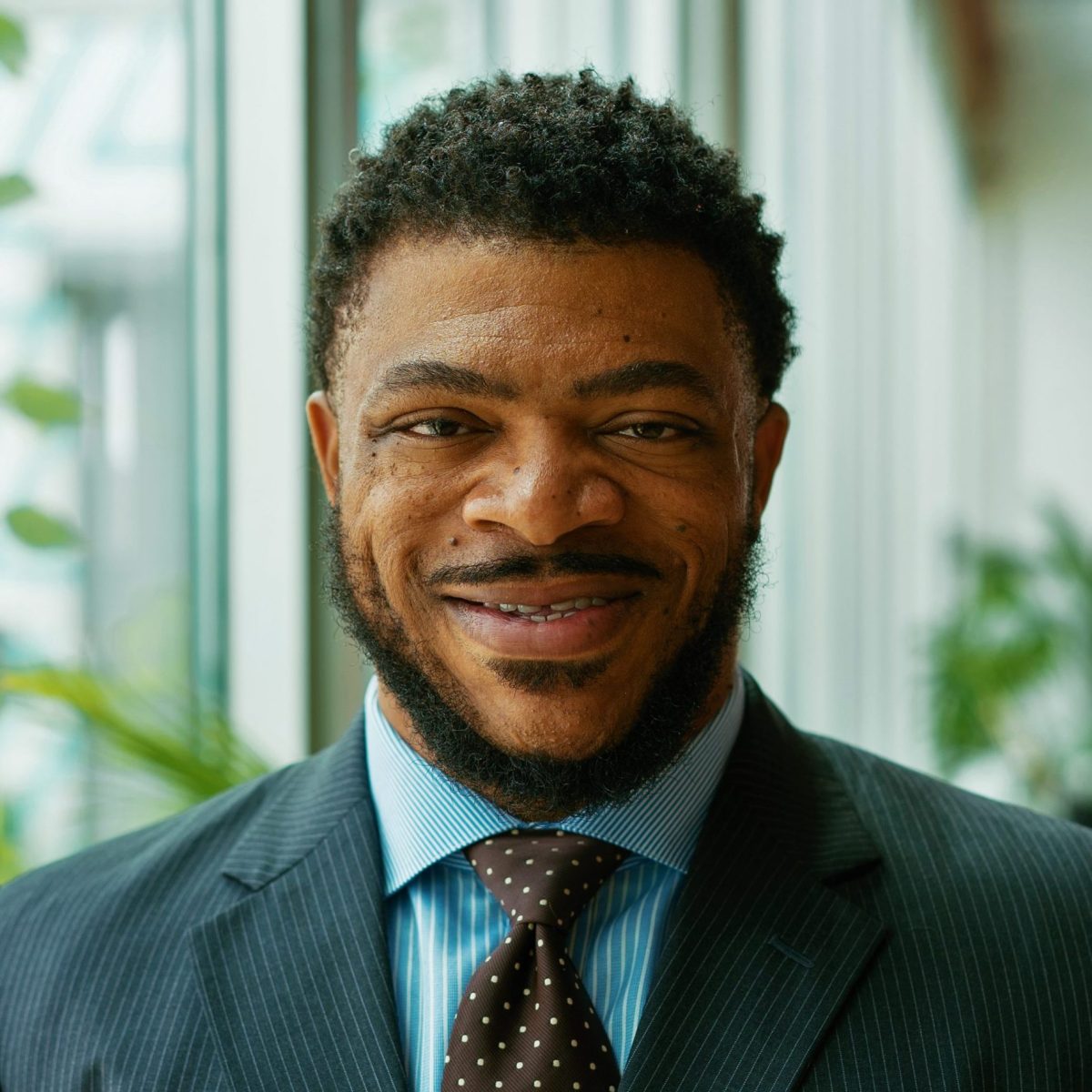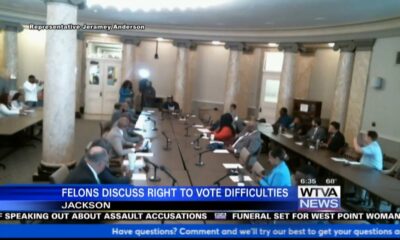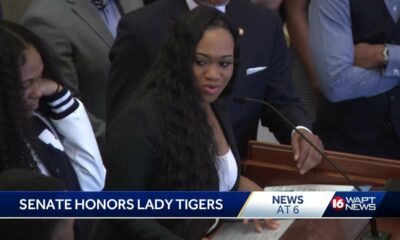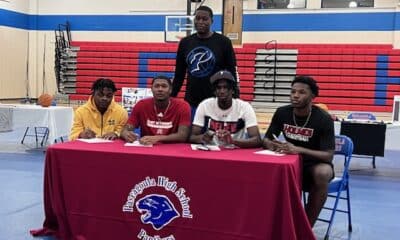Mississippi News
Von Gordon talks critical race theory
‘Don't be intimidated by the jargon': Von Gordon talks critical race theory in Mississippi

For much of the last two decades, Von Gordon has encouraged Mississippians to talk about race. As a student at the University of Mississippi, he helped organize the first Statewide Student Summit on Race. Gordon, 42, is now the executive director of the Alluvial Collective, formerly the William Winter Institute for Racial Reconciliation. The nonprofit aims to create stronger communities in Mississippi through educational events, like hosting seminars, assisting in oral histories, and mentoring high school students.
This session, discussion of race and racism in Mississippi in K-12 school and university classrooms are coming under threat. Last week, the House passed Senate Bill 2113, which seeks to ban the teaching of critical race theory in public schools. Now, Gov. Tate Reeves is poised to sign the legislation, and educators across the state are anxiously waiting to see how it will impact their ability to teach about race and racism in Mississippi.
The day after the House passed SB 2113 last week, Mississippi Today spoke with Gordon for “Mississippi in the Know,” a series of free breakfast conversations with policy experts. In this interview, which has been edited and condensed for length, Gordon talked about school desegregation in Mississippi and how that inspired Derrick Bell's writings on critical race theory.
Molly Minta: Derrick Bell is one of the founders of critical race theory, and he worked as a lawyer for the NAACP legal defense (fund), and he actually litigated a school desegregation case in Leake County. His experiences working on that case were really formative for the academic work he later did to develop critical race theory. I would love it if you could talk to us a little bit about his experiences.
Von Gordon: There's a definition that I'm really fond of. Lee Anne Bell describes it in a book about teaching for social justice, and she writes: “Critical race theory analyzes and challenges mainstream narratives in law, history, and popular culture that uphold the status quo.” And a big part of how they do that is through counter storytelling.
I think it's really important that Dr. Bell spent a lot of time here, and it was informative in how he thought about this theory. So he is already in Mississippi doing some work in the early 1960s. There's an opportunity to help with the desegregation of Leake County schools.
One of the interesting things is, there was a Rosenwald School already there that was of deep value to the community. It had served the community well, even in the context of gross underfunding and, frankly, gross segregation. So there was a need that the Black people in particular in that community had to have an equitable education experience. The Legislature could have fixed that, but it did not.
There were people (in Leake County) who were concerned that by desegregating the schools, they might lose this really valuable asset that they had poured themselves into and that had produced a lot of opportunity for their children — and actually (a lot of opportunity) for them.
Now, one of the things I've learned about these communities — Harmony is one of them — is that they are really strong and resilient communities. We know in other parts of the country, strong communities like that got destroyed, whether you're talking about Tulsa or Rosewood or others. The context really matters in that way. (Bell) recognizes that the law is really critical to desegregation, to unleashing the potential of being a citizen in the United States.
When we think about what critical race theory seeks to do, it seeks to have a full examination of the impact of race in our society. And I think it's been fun, and in some ways funny, to watch this conversation happen nationally, in part because in many ways it is detached both from the real impact of systemic racism, but also what it looks like in the communities where we live and work.
MM: Another tenant of critical race theory (is) this idea of “interests converging.” Could you talk to us a little bit about that, how we can understand that idea in Mississippi?
VG: Dr. Bell is one of the scholars who has written most about this. He talks specifically about some of the civil rights gains and how they were really made possible, not because there was this great awakening in the country that Black people or Native people needed their rights or they deserve their rights. That was a part of it, but it was also that it benefited white America too.
For folks who are curious about the civil rights struggle of the sixties — when the president got involved most actively (in Birmingham), it was when the State Department and diplomats started to send back how what they were seeing on TV played across the globe. As the Cold War is emerging, we cannot project out equality and the dignity and respect of every human being, and here we have German shepherds biting our community's babies.
The passage of the Civil Rights Act and the Voting Rights Act — based on Dr. Bell's work — had as much to do with what benefited the whole as it did just the need to extend these rights, basically to live out our Constitution. I think that's an important thing for us to consider.
I've always been fascinated by debates about affirmative action. When I was in college and since, one of the things that I've always heard about affirmative action policies was that the biggest beneficiary of those policies were white women. And most of the data bears that out. But the burden of affirmative action and the stigma around it is typically born by Black people.
I think we have to ask ourselves … Are we doing things for the right reason? Or doing things in the interest of equity and justice? Or are we doing them also because it's in our self interest?
There's a windfall of infrastructure dollars, right, coming into the state. One of the things we know about infrastructure is, historically, where what got placed had an impact on the people living there. Most of the negative impact, particularly in our urban centers, are … born out by the black and brown people in those countries.
So are we thinking intentionally at our Department of Transportation about how this amount of infrastructure dollars are going to be spent? How are we thinking about equity, or are we only looking for where our interests converge?
MM: When I was interviewing students in Mississippi's only law school class on critical race theory, they were talking to me about how, on the one hand, the idea of interest convergence can seem a little like Machiavellian almost. It's not these pure ideas of equality and justice that are leading to these social changes, but the economic or material realities of, how does this change benefit people who have power in society? There's that more cynical interpretation, but there's also a way of thinking about it where it can actually provide a roadmap for how to create change in society.
VG: My friend and colleague now at the Alluvial Collective, Chauncey Spears, often talks about how we prepare ourselves and young people to be better citizens. One of the important things I think we have to do is let go of some fear so we can really do a deep and honest examination of who we are and how we show up in the world, and the institutions we're part of and the systems that we encourage.
Think about where the fear is coming from, cause we're seeing this with the whole CRT debate. It's rooted in the fears around what young people are learning and what that might tell them about who we are — or make them question about who we are.
I've worked with amazing young people for a long time. I've been in spaces where we've talked about the death of Emmett Till, and the white students in the room have shared all of the emotions of guilt and shame and assume blame and a lot of other things, almost all of which are unhealthy when it comes to how we move forward. And I've had the experience of, Black kids, particularly Black males, 14 or 15, wondering about their own value.
Critical race theory is just one of many different ways that we need to examine the impact of oppression in our society. It is one thing to think about where we want to go and how we get there. It's another thing to do an examination about how we have destroyed human potential for generations.
Von Gordon
A really good friend of mine said this about white kids learning about slavery and feeling some kind of way – that parents should applaud their white child who comes home and is upset about slavery as white person, because it's evidence that their child has a moral compass. When we think about the value of a moral compass for budding citizens, that's a really important thing. And for a black child to learn that they do have value. What happened to Emmett Till is not something anyone deserved for any reason.
The complexities of how our young people are raised to explore our history, but also kind of draw from that (history) lessons for how they need to show up as citizens should really be at the heart of this, not our fears.
MM: What you're saying connects to what you talked about at the beginning of our conversation about an important aspect of critical race theory being counter-storytelling. … I'm wondering if you could maybe talk a little bit more about other examples of counter storytelling in Mississippi?
VG: I'll tell you, I remember talking to … my middle daughter. She was talking about Lewis and Clark and the expedition. She was so proud of what she learned. Her older sister asked her, ‘so tell me about the other people in that story? What do you know about them?'
There were Native people there, right? They're just the backdrop. Not only is that disrespectful, it's a really bad way for us to learn our history. If we polled our middle school students and asked them if the original people in Mississippi, if any of them are still in Mississippi? They would probably say no, they died a long, long time ago. But Chief (Cyrus) Ben is a steward of an incredible history and community that most of our young people don't even know exists.
In our work, first of all, we don't go anywhere we're not invited. When we get there, one of the first things we do is put people in circles, because circles are one of the oldest forms of community.
We recognize that at the fundamental level, where people are living their lives, they need to have a couple of things happen. They need to be able to see each other fully. They need to be able to hear each other fully. And the one thing everybody in the circle is an expert in, is their stories.
It's intimidating when you show up in a space, and you know there are people in there with expertise, and you don't feel you have an expertise. But when you show up and all you have to do is tell your authentic stories, who you are and where you come from and what shaped you? And that's all everybody else has a license to do? Then you get to know each other in a unique and different way.
MM: When people are sharing their personal stories, what kind of questions do their community members tend to ask them?
VG: One of the first things I always hear is shock. Like, ‘oh my god, I didn't know that about you.' Or, ‘I had the same experience.'
Let me come back to the desegregation of schools in Mississippi. … When the schools in Mississippi were desegregated, that was an incredibly traumatic experience for everybody. Now, critical race theory will challenge you to examine who got the jobs at the newly integrated schools and who had to go find another line of work. But it was a deeply traumatic experience for everyone. And not many people have had the opportunity to tell those stories or share them with folks who might've been on the other side of that trauma.
The assumption might be if you're a white kid at Murrah that it was hard on you, cause you went home for Christmas and you come back and bam, bam, bam. Your world is turned upside down. You might think the brown kids who were going to your school benefited. All you can think about is the benefit that they were supposed to get from it — not recognizing that, perhaps for the first time in their lives, they're looking at a teacher wondering if that teacher has their best interest at heart, wondering if that teacher sees their humanity?
Imagine the position at that point in time that a Black family who was already living on the margins, imagine how the power they felt — or did not feel — sending their kid into a newly integrated school, where they didn't feel like anybody in that administration answered to them?
Like that happened all over our state. Several people have said this to me over the years, particularly in Tupelo. They have this thing they call the Tupelo way. And one of the things they pride themselves in is the approach they took to desegregating their schools. Some real-meaning people brought the community together and said. ‘we're going to make sure our public schools are our institutions.'
There can be a healthy debate about how they actually did that, or whether that's really, really true. But you look at how those communities sit in Mississippi now, how they are thriving? There's a direct correlation between the sense of leadership around doing as little harm as possible compared to other communities which embraced a different way of educating their young people.
MM: I have just one last question … is there an aspect of the whole discourse and dialogue around critical race theory … that I haven't asked or something you want to point out that you feel like people miss?
VG: Critical race theory is just one of many different ways that we need to examine the impact of oppression in our society. It is one thing to think about where we want to go and how we get there. It's another thing to do an examination about how we have destroyed human potential for generations.
I can't think of anybody I know who would read a book from beginning to end, from cover to cover, about critical race theory that would not come away with a sense of conviction about being better, about our need as society to be better.
We often say that previous generations did not know. One of the things that Dr. Kendi lays out really well in (Stamped from the Beginning) is, people knew, and we got the history that we have. People knew. We're going to have to do better ourselves.
In really personal ways, this exploration of who we are matters, and CRT is one among many, many others that we absolutely need to employ. Don't be intimidated by the jargon. Don't be intimidated by what the talking head on TV said about it. Get in there for yourself. That's my story, I'm sticking to it.
This article first appeared on Mississippi Today and is republished here under a Creative Commons license.
Mississippi News
Events happening this weekend in Mississippi: April 26-28
SUMMARY: Unwind this weekend with a variety of events happening in Mississippi. From concerts to festivals, there is something for everyone. Enjoy The Magic Flute in Jackson, the Natchez Trace Festival in Kosciusko, or the Lynch Street Festival in Jackson. For music lovers, there's Music for the Heart and Soul in Jackson and Dancing on the River in Natchez. Foodies can attend the Pearl Day in The Park BBQ Cook-Off in Pearl or the Wing Competition in Ridgeland. There are also opportunities for art enthusiasts with various exhibits and markets happening throughout the weekend. The options are endless for a fun-filled weekend in Mississippi.
The post Events happening this weekend in Mississippi: April 26-28 appeared first on www.wjtv.com
Mississippi News
Warm and breezy for the weekend – Home – WCBI TV
SUMMARY: Temperatures will be above average in Columbus, Mississippi for late April, reaching the lower to middle 80s. Rain and thunderstorms are expected to return to the forecast on Monday. The weekend will be warm and breezy with highs in the low to mid 80s, although there might be occasional showers. Heading into next week, showers and storms are likely on Monday afternoon and evening, with a potential for locally heavy rain and a risk of severe weather. Scattered showers may continue through Tuesday and Wednesday as a slow-moving front approaches.
The post Warm and breezy for the weekend – Home – WCBI TV appeared first on www.wcbi.com
Mississippi News
House Speaker Mike Johnson appears at Mississippi event
SUMMARY: US Speaker of the House Mike Johnson visited Mississippi and spoke at Jackson Preparatory School during an event hosted by NACLC. While reporters were unable to ask him questions, student Sophie Slade asked him about balancing foreign and domestic policy priorities. Johnson emphasized the importance of America first but not America only, and expressed concern about projecting weakness in foreign policy. He also discussed issues at the southern border and his recent speech at Columbia University about the protests following the war between Israel and Hamas. Additionally, officials announced that the US is expected to provide $6 billion to fund long-term weapons contracts for Ukraine.
The post House Speaker Mike Johnson appears at Mississippi event appeared first on www.wjtv.com
-
228Sports6 days ago
From Heartbreak to Hoop Dreams: Pascagoula Panthers Springboard from Semifinal Setback to College Courts
-
Mississippi News5 days ago
2 dead, 6 hurt in shooting at Memphis, Tennessee block party: police
-
Local News1 day ago
Sister of Mississippi man who died after police pulled him from car rejects lawsuit settlement
-
Mississippi News5 days ago
Forest landowners can apply for federal emergency loans
-
Mississippi Today1 day ago
At Lake High School in Scott County, the Un-Team will never be forgotten
-
Mississippi News7 days ago
Burnsville man arrested in Prentiss County on drug related charges
-
Mississippi News4 days ago
Cicadas expected to takeover north Mississippi counties soon
-
Mississippi News3 days ago
Viewers make allegations against Hatley teacher, school district releases statement – Home – WCBI TV













































